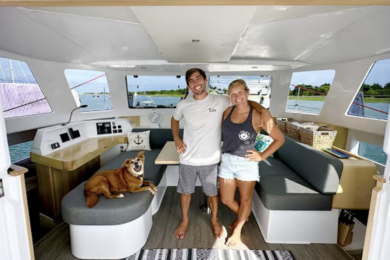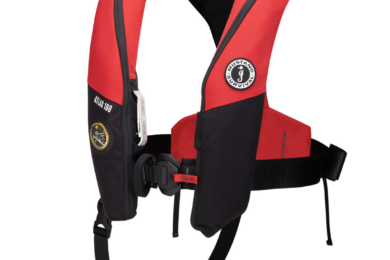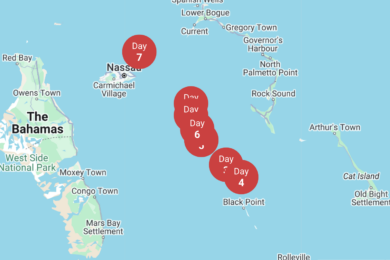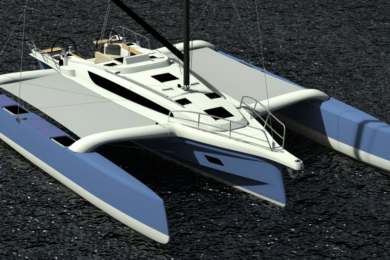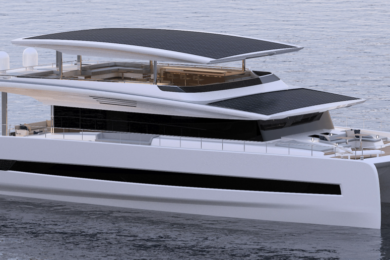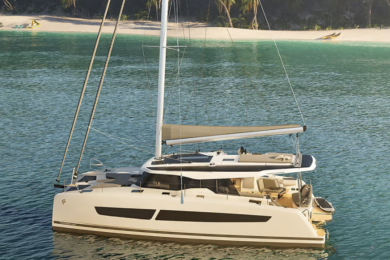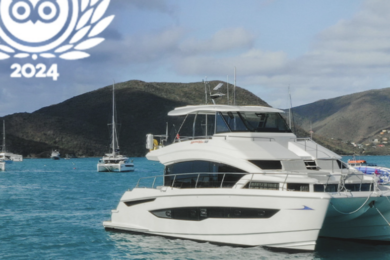Here are the 13 biggest mistakes made when purchasing a used catamaran and how to avoid them (Published Winter 2016)

1: Searching for the largest, cheapest catamaran for your budget: Of course you should buy the largest, most inexpensive boat, right? This is the very definition of a bargain, right? Well, maybe not.
People tend to think bigger rather than smaller and feel confident that buying a lot more boat for a lot less money is smart. And in some ways, when shopping for a catamaran this makes some sense, as even very large catamarans are considerably smaller inside than a buyer’s home or apartment. From that perspective more storage space can be alluring. But taking this mindset with you when shopping for just the right cat is actually the worst way to purchase a vessel.
It is generally wiser to get the smallest and newest boat to serve your needs and budget rather than the largest one available. Consider that big, inexpensive catamarans often need a substantial refit and will always cost more to sustain, maintain, insure, move and slip. The older and cheaper a boat becomes the higher a buyer’s risk becomes that a costly surprise is around the corner, regardless of how professionally the boat was surveyed prior to purchase. Costs scale almost logarithmically with larger boats.
2: Buying a boat that does not bring you real pleasure: If you are a sailor and truly enjoy sailing, then buy a catamaran that really sails. As the late Harry Chapin put it, “It’s got to be the goin’ not the getting there that’s good.” Sailing isn’t just about arriving at places; it’s about enjoying the time it takes to get to them. So you must both be proud of your boat and “connect with her” when you are sailing. A great many buyers regret settling for a boat that had a lot space and volume, but which they never truly enjoyed sailing. On the other hand, do not sacrifice too much comfort for the sake of speed. Finding a balance is absolutely vital if you are to remain happy with your catamaran.
3: Buying a Boat that is Uncomfortable: If you’re buying a catamaran to live-aboard, make certain you find one you actually enjoy living aboard. This sounds simple but remember, it must be a pleasure to cook on this vessel, to sleep on soundly, to find a private place to read or simply stare into the night sky on occasion as well. Balancing interior volume against performance is critical. Complicating this is the fact that there is usually more than a single head and heart weighing in on this decision. If one partner, for instance, wants to turn the boat into a home away from home and the other wants to dash from port to port at high speed, then those battling visions have to be reconciled to meet the reality of the marketplace.
4: Getting the Wrong Catamaran for Your Voyaging Agenda: There is no ideal catamaran; they are all full of compromises, but there are certainly boats that are far more suited to the voyages you have in mind. Once the voyage and use of the boat is decided upon, ask some hard questions: Is the payload sufficient for the gear I want to carry? Are the accommodations adequate for what I need? Is she fast enough for my needs? Does she have the cruising range and speed under power for the types of trips I plan to take? Remember, in order to know if the boat suits your needs you must know exactly how you’ll use her.
5: Getting a Boat that is a bit too much to handle and maintain: People who buy boats come in a wide range of competencies and talents. Some are quite skillful sailors and seamen. Others have much to learn and are eager for the guidance. Still others are pretty good sailors but not very strong mechanically and struggle to maintain their boats properly.
It is important when buying a boat to make sure you can handle it. It is important for you to know that it will not prove to be too daunting for you to either sail or maintain. So, make sure you have a clear idea of your own skill set. Take the time to be honest with yourself, your crew and others when assessing your talents. Match these with your dream agenda. Do they match? If not, what do you need to do to make certain they do?
6: Taking web blogs and forums too seriously: We have all learned how to apply the right amount of skepticism to what we read on the internet over this last decade. But, it is wise to also consider the old adages about buying and selling and loving and hating boats when trolling the internet for insights on particular models and even certain cruising agendas. Of course, there is good information out there, but it is also wise to blend this with the more seasoned and exacting intelligence of someone who has a vast amount of experience with multihulls and is someone you know and trust.
7: Failing to establish the “Bristol” value of a used catamaran: The trick when buying a used boat is to establish her “Bristol” value. A Bristol boat is one that has been maintained and operated by a perfectionistic and is the best possible example you could ever find of a boat of this brand and vintage. Chances are such a boat cannot even be found. But it is important to know, if such a boat did exist what is the most someone would ever pay for her in the current market, in her current location? Then when you go in search of a used boat you must subtract from that Bristol value all the things that keep her from being worth top dollar. Does she need new engines? A new generator? Paint? Usually such an analysis generally leads to four conclusions:
- Most used boats can’t be brought back into Bristol condition without far exceeding Bristol value, so beware of the fixer upper.
- If you can’t afford a Bristol boat, make sure you never put more money into the boat than her Bristol value.
- If you lack the budget to get a really top condition boat, do not get drawn into the trap of thinking it has to be Bristol to do its job. In other words, if you can live with a boat that has some cosmetic issues, live with it.
• As long as she is seaworthy and serves your needs, she does not have to look brand new.
Never forget that boats come in a range of qualities—there are BMWs and there are mid-level Fords and you can’t take a lower-level yacht and make her a higher level yacht without over spending on her.
8: Miscalculating the value of a catamaran: Since establishing the Bristol value of a yacht is so vital to making a good purchasing decision, you need to get a very accurate idea of what that value is. This has gotten a lot harder in the internet age because there are many more vendors, more for sale by owner sellers, and no central agency that is truly attempting to collect, verify and track prices.
For this reason the best option is to find a broker who specializes in the types of boats you are interested in, someone who makes a market in such boats on a daily basis and who has a strong grasp on what is selling and for how much and why. Of course, this must be a broker you can trust. Make sure you return your broker’s expertise with loyalty and it is likely that you will be happy with your purchase on multiple levels.

9: Thinking you are getting a great deal if the seller comes down in price by 50 percent: To a certain extent, what an owner is asking for a boat, or the price a brokerage company is advertising a boat for, is to some extent irrelevant. The only thing that is relevant is what a boat is worth, based on what the market is paying for that type of boat, year, in that location and in that market. So how do you sort the market out enough to judge a good deal from a bad one? Is it merely buying the boat for considerably less than the asking price?
A good deal can only be ascertained by three things: knowing the price of a Bristol example of that boat, knowing the defects of the boat under consideration which keep her from being Bristol, and knowing what it might cost to place her into Bristol condition.
10: Flying all over the place before you establish general condition and price: Many buyers feel they have to see a boat up close before they can make an offer on it. It is not uncommon for potential buyers from Europe or even Australia to fly to the States to buy a yacht without having first done some basic homework. This can be a costly leap of faith.
The smarter thing to do is to have the desired yacht evaluated prior to a survey, either by a trusted broker who is working for you, or to hire a local surveyor to do a vessel pre-inspection. This is not a complete survey, but usually just a set of pictures and a careful list of visible defects. Only after this is done should the potential buyer, in advance of a survey, make an offer on the boat pending inspection.
11: Choosing the wrong surveyor to advise you: It is important that a buyer hire a competent surveyor to protect his interests by assessing the boat’s true condition. If the boat needs to meet a standard, say for insurance purposes, then the surveyor may need specific qualifications. Ideally, you will find a surveyor who has experience surveying the type of boat you are buying. However, do not assume it is the job of the surveyor to do anything but find all of the problems with a given boat. Sadly, some surveyors lead buyers to reject boats they should have bought and to accept boats they shouldn’t. In the end, just always remember this: every boat has a value in the condition it is in. When you can establish that value properly, you’ll assume far less risk when buying a used boat.
12: Choosing a broker without deep experience in the boats you are interested in: Boats are specialized vessels. Catamarans, fishing skiffs, monohulls, and all other boats fetch radically different prices in the used boat market. Make sure your broker primarily sells the type of boat you wish to buy, and then verify the agent has dedicated broker escrow accounts and has a solid reputation and, hopefully, licenses, insurance and bonding. A professional broker should be able to provide you with verifiable “sold” comparable figures for the types of boat you are considering and help you understand the current market before you make an offer. He or she can tell you what the range of value is for the boat you are considering.
13: Failing to Relax Into the Experience and Patiently Grow Into the Cruising Lifestyle: 
When I first started working with buyers or couples setting off on their dream voyage, I thought I could tell who would be successful and who would struggle to adapt. But I was often surprised by the people who make a great success of their life as cruisers, and equally surprised by those who fail to get the most enjoyment from their adventures on the water. I think a lot of people fail to take it easy enough at first to slowly build their confidence and competency. How you start the journey, and how you acclimate your family and friends or spouse to the cruising life will make all the difference.
Phil Berman is the president of The Multihull Company and the author of several books on catamaran racing and sailing. He is a Certified Professional Yacht Broker from the Yacht Brokers Association of America.


